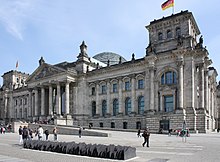Albert Janka
Albert Janka (born May 10, 1907 in Chemnitz ; † April 13, 1933 in Reichenbach (Vogtland) ) was a German communist who was arrested by the National Socialists shortly after the " seizure of power " and killed a few weeks later.
Life
Janka came from a working class family. His father Adalbert - a toolmaker - as well as his younger brother Walter and his other siblings were active members of the KPD .
At the age of 25, Janka took over the leadership of the communists in Plauen and Vogtland. In July 1932 he was elected as the youngest member of the Reichstag . In January 1933 he organized mass demonstrations in Plauen to prevent Hitler from coming to power . After the National Socialist "seizure of power" he won one of the 81 KPD seats in the Reichstag election on March 5, 1933. Two days later, on March 7th, Janka declared his resignation from the KPD in a letter to NSDAP district leader Alfons Hitzler . He was arrested and received the cynical comment for his application for NSDAP membership, submitted one day later, that this was "only possible after a very long examination period ... perhaps in a concentration camp". At the beginning of April 1933, Janka was abducted to the “Volkshaus” in Reichenbach, which was abused by the SA and SS as a “ protective custody camp ”. A few days later he was found hanged there with marks of brutal abuse.
After his funeral, the father and siblings were imprisoned and sentenced to several years in prison.
Commemoration
Since 1992 one of the 96 memorial plaques for members of the Reichstag murdered by the National Socialists has been commemorating Janka near the Reichstag in Berlin .
literature
- Janka, Albert . In: Hermann Weber , Andreas Herbst : German Communists. Biographical Handbook 1918 to 1945 . 2nd, revised and greatly expanded edition. Karl Dietz, Berlin 2008, ISBN 978-3-320-02130-6 .
Web links
- Günter Trete: Albert Janka, an almost forgotten communist at vogtlandbote.de
- Albert Janka in the database of members of the Reichstag
Individual evidence
- ↑ Udo Grashoff : First red, then brown? Defectors from the KPD to Nazi organizations in 1933 . In: Günther Heydemann , Jan Erik Schulte , Francesca Weil (eds.): Saxony and National Socialism . Vandenhoeck & Ruprecht, Göttingen 2014, pp. 215–236, here pp. 221–223.
| personal data | |
|---|---|
| SURNAME | Janka, Albert |
| BRIEF DESCRIPTION | German politician (KPD), MdR |
| DATE OF BIRTH | May 10, 1907 |
| PLACE OF BIRTH | Chemnitz |
| DATE OF DEATH | April 13, 1933 |
| Place of death | Reichenbach (Vogtland) |
